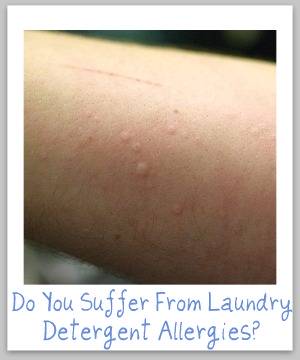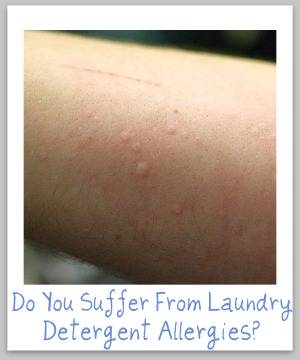Do you ever experience redness, itchiness, or rashes on your skin after washing your clothes? You may be surprised to learn that laundry detergent allergies are more common than you think. Yes, that’s right! It’s not just food or pet allergies that people deal with. Laundry detergents can also cause allergic reactions in some people.
Laundry detergent allergies can be a frustrating and uncomfortable experience, especially if you don’t know what’s causing your symptoms. In this article, we’ll explore the symptoms of laundry detergent allergies, what ingredients to watch out for, and tips on how to avoid this type of allergy. So, let’s dive in and learn more about laundry detergent allergies.

Can You Be Allergic to Laundry Detergent?
Laundry detergent is a common household product that is essential for keeping our clothes clean and fresh. However, for some people, laundry detergent can cause allergic reactions that range from mild to severe. In this article, we will explore whether it is possible to be allergic to laundry detergent and what you can do to prevent or manage an allergic reaction.
What is a Laundry Detergent Allergy?
A laundry detergent allergy is a type of allergic reaction that occurs when your immune system overreacts to the ingredients in the detergent. This can lead to a range of symptoms such as skin irritation, itching, redness, swelling, and even difficulty breathing. The most common cause of a laundry detergent allergy is the presence of fragrances, dyes, and other chemicals in the detergent that can irritate the skin or trigger an allergic reaction.
If you suspect that you have a laundry detergent allergy, you should consult a doctor or allergist to confirm the diagnosis. They may recommend a skin test or blood test to identify the specific allergen that is causing the reaction. Once you know the cause of the allergy, you can take steps to avoid exposure to the allergen and prevent future allergic reactions.
Symptoms of a Laundry Detergent Allergy
The symptoms of a laundry detergent allergy can vary depending on the severity of the reaction and the individual’s sensitivity to the allergen. Some common symptoms of a laundry detergent allergy include:
– Skin irritation, itching, redness, and swelling
– Hives or rash
– Difficulty breathing or tightness in the chest
– Nausea or vomiting
– Headache or dizziness
If you experience any of these symptoms after coming into contact with laundry detergent, you should seek medical attention immediately.
Causes of a Laundry Detergent Allergy
The most common cause of a laundry detergent allergy is the presence of fragrances, dyes, and other chemicals in the detergent. These ingredients can irritate the skin or trigger an allergic reaction in some people. Some other factors that can contribute to a laundry detergent allergy include:
– Exposure to other allergens such as pollen or pet dander
– Pre-existing skin conditions such as eczema or psoriasis
– Weakened immune system due to illness or medication
If you have a history of allergies or have sensitive skin, you may be more prone to developing a laundry detergent allergy.
Preventing a Laundry Detergent Allergy
If you are prone to developing a laundry detergent allergy, there are several steps you can take to prevent or minimize allergic reactions. Here are some tips:
– Choose a hypoallergenic laundry detergent that is free from fragrances, dyes, and other irritants.
– Wash your clothes in hot water to kill any allergens that may be present.
– Rinse your clothes thoroughly after washing to remove any residual detergent.
– Avoid using fabric softeners, dryer sheets, or other laundry products that contain fragrances or other irritants.
– Wear gloves when handling laundry detergent to avoid skin contact.
Managing a Laundry Detergent Allergy
If you do develop a laundry detergent allergy, there are several steps you can take to manage the symptoms and prevent future allergic reactions. Here are some tips:
– Wash the affected area with soap and water to remove any residual detergent.
– Apply a cool compress to reduce itching and swelling.
– Use over-the-counter antihistamines or topical creams to relieve symptoms.
– Avoid scratching or rubbing the affected area, as this can worsen the symptoms.
– Consult a doctor or allergist for advice on managing the allergy and avoiding exposure to the allergen.
The Benefits of Hypoallergenic Laundry Detergent
Using hypoallergenic laundry detergent can offer several benefits for people who are prone to developing allergies or have sensitive skin. Here are some benefits of using hypoallergenic laundry detergent:
– It is free from fragrances, dyes, and other irritants that can trigger allergic reactions.
– It is gentle on the skin and can reduce the risk of skin irritation or other skin conditions.
– It is safe for use on baby clothes and other delicate fabrics.
– It is environmentally friendly and can reduce the impact of harsh chemicals on the environment.
Laundry Detergent Allergy vs. Other Allergies
A laundry detergent allergy is just one type of allergy that can affect people. Here are some differences between a laundry detergent allergy and other types of allergies:
– A laundry detergent allergy is typically a contact allergy, meaning that it occurs when the skin comes into contact with the allergen. Other allergies such as food allergies or seasonal allergies can occur through ingestion or inhalation.
– A laundry detergent allergy typically causes symptoms such as skin irritation or itching, while other allergies can cause a range of symptoms such as sneezing, runny nose, or watery eyes.
– A laundry detergent allergy can be managed by avoiding exposure to the allergen or using hypoallergenic laundry detergent, while other allergies may require medication or other treatments to manage the symptoms.
The Bottom Line
In conclusion, it is possible to be allergic to laundry detergent due to the presence of fragrances, dyes, and other chemicals in the detergent. If you suspect that you have a laundry detergent allergy, you should consult a doctor or allergist for advice on managing the allergy and avoiding exposure to the allergen. Using hypoallergenic laundry detergent can offer several benefits for people who are prone to developing allergies or have sensitive skin. By taking the proper precautions, you can minimize the risk of developing a laundry detergent allergy and enjoy clean, fresh clothes without any adverse reactions.
Frequently Asked Questions
Laundry detergent is an essential product for keeping our clothes clean and fresh. However, many people may experience allergic reactions to laundry detergent. In this article, we will answer some frequently asked questions about laundry detergent allergies.
Can you be allergic to laundry detergent?
Yes, it is possible to be allergic to laundry detergent. Some of the common symptoms of laundry detergent allergies include skin rash, itching, redness, and dryness. In some severe cases, people may also experience difficulty breathing, wheezing, and coughing.
The allergic reaction is caused by the chemicals present in the laundry detergent, which may irritate the skin or cause an allergic reaction. Therefore, it is essential to choose the right laundry detergent that suits your skin type and is free from harsh chemicals.
What are the common allergens in laundry detergent?
There are several common allergens present in laundry detergent, which may cause an allergic reaction. Some of the common allergens include fragrances, dyes, enzymes, preservatives, and surfactants. These chemicals may cause skin irritation, itching, and rashes.
Therefore, it is essential to opt for laundry detergents that are free from harsh chemicals and allergens. You can also choose hypoallergenic laundry detergents that are specially formulated for sensitive skin.
How to prevent laundry detergent allergies?
You can prevent laundry detergent allergies by choosing the right laundry detergent that suits your skin type. It is recommended to opt for fragrance-free and dye-free laundry detergents that are gentle on the skin. Also, make sure to rinse your clothes thoroughly to remove any residual detergent.
If you have sensitive skin or a history of allergies, it is advisable to test the laundry detergent on a small patch of skin before using it on your clothes. This will help you determine if the laundry detergent is causing an allergic reaction.
What are the alternative laundry detergents for people with allergies?
If you have allergies to laundry detergent, you can opt for alternative laundry detergents that are free from harsh chemicals and allergens. Some of the alternative laundry detergents include natural laundry detergents, organic laundry detergents, and hypoallergenic laundry detergents.
These laundry detergents are gentle on the skin and do not contain any harsh chemicals or allergens. They are specially formulated for people with sensitive skin or allergies.
When to seek medical help for laundry detergent allergies?
If you experience severe symptoms of laundry detergent allergies, such as difficulty breathing, wheezing, or coughing, you should seek immediate medical help. Also, if the symptoms persist even after stopping the use of the laundry detergent, you should consult a doctor.
Your doctor may prescribe antihistamines or topical creams to alleviate the symptoms of the allergic reaction. In severe cases, you may require oral corticosteroids or other medications to control the allergic reaction.
Jordan Samuel Skin Talks: Is laundry detergent creating your skin issues?
In conclusion, it is possible to be allergic to laundry detergent. The chemicals and fragrances used in many detergents can cause skin irritation and allergic reactions, especially for those with sensitive skin. If you experience symptoms such as itching, rash, or hives after using a new detergent, it’s important to switch to a fragrance-free and hypoallergenic option.
It’s also important to note that even if you don’t have a diagnosed allergy, using a gentler detergent can still be beneficial for your skin and overall health. Many natural and plant-based detergents are available that are free from harsh chemicals and fragrances, making them a great option for those who want to avoid potential irritants.
Ultimately, the key to avoiding allergic reactions to laundry detergent is to be mindful of the ingredients in the products you use and to choose options that are gentle and hypoallergenic. With the right detergent, you can keep your clothes clean while also protecting your skin and overall health.

